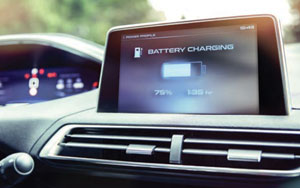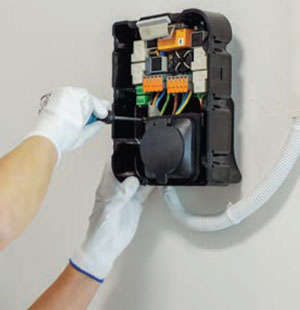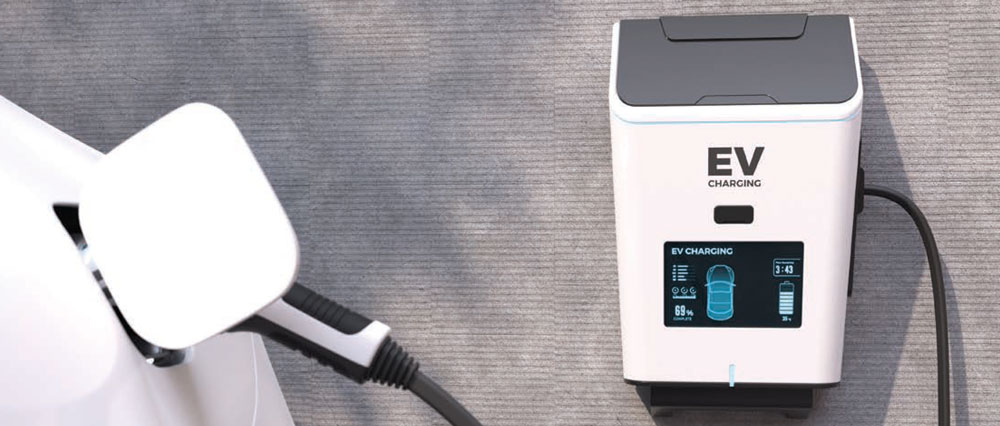AMPED UP

Equip Your Home for EV Charging
With the steady growth in the number of hybrid and all-electric cars, trucks, vans and SUVs being offered by U.S. and overseas automakers, more and more vehicle buyers will be considering whether “juice” from the power grid should replace all or part of the gasoline they’ve been purchasing.
 Just imagine: Pull into the garage, connect the car to the on-wall charging station and head inside. A few hours later, your ride will be “fueled” and ready to go. With an 80- to 330- mile, full-charge range (depending on make and model), an all-electric vehicle (EV) is more than adequate for most Americans’ daily driving needs – estimated at just 30 miles by AAA.
Just imagine: Pull into the garage, connect the car to the on-wall charging station and head inside. A few hours later, your ride will be “fueled” and ready to go. With an 80- to 330- mile, full-charge range (depending on make and model), an all-electric vehicle (EV) is more than adequate for most Americans’ daily driving needs – estimated at just 30 miles by AAA.
For that vignette to play out, however, drivers must be able to charge their EVs at home between trips. EVs typically come with a charging cord that can be plugged into a standard 120-volt outlet. But for the faster charging times that most EV owners prefer, their garages must be equipped with a Level 2 charging station – hardly a DIY task unless one happens to be a master electrician.
Time to call in the experts
That’s where companies like Roanoke-based Southern Trust Home Services come into play. Project Manager Brandon Beck leads one of Southern Trust’s two teams that do EV charger installations. “We begin with an assessment of existing electrical service to the home,” Beck explains. “Residential Level 2 chargers, which can fully charge most EVs in eight hours or less, require a minimum of 200 amp service.”
Super-fast chargers – like those typically found at commercial roadside charging locations – require 200-400-amp circuitry. Charging time goes way down, but cost for the installation increases considerably.
And while EVs typically come with a charging cord that plugs directly into an existing 120-volt outlet, that approach provides only a painfully slow charging rate and, worse, can create a fire safety hazard. Says Beck: “Installing a Level 2 220-volt charger means you’ll have built-in sensors that shut down the fast-charge once batteries are fully charged. Nearly all Level 2 chargers also enable the user to remotely control and monitor the charging process through a cell-phone app.”
 Installing a Level 2 charger usually takes less than a day and costs around $2,500, including the cost of the charger itself. Cost goes up if the main electrical panel is located far from the charging location or if routing of the dedicated circuit is complicated or restricted. A federal tax rebate of up to $1,000 often applies, and certain localities offer up to 15 percent discounts on electricity the chargers consume during off-peak hours.
Installing a Level 2 charger usually takes less than a day and costs around $2,500, including the cost of the charger itself. Cost goes up if the main electrical panel is located far from the charging location or if routing of the dedicated circuit is complicated or restricted. A federal tax rebate of up to $1,000 often applies, and certain localities offer up to 15 percent discounts on electricity the chargers consume during off-peak hours.
Most Level 2 chargers get hard-wired into their circuit, but some can be plugged into a clothes-dryer-style 220 outlet.
“We did about 75 charger installations in 2023 and expect that to increase this year,” Beck says. “And most new construction anticipates the likely future need for EV charging by including the necessary circuitry to the garage in the wiring plan.”
Is an EV right for me?
It depends. Car buyers should consider their own driving patterns when making that decision. Plug-in EVs are costly, with luxury models from the most respected brands commanding well over $100,000 when new. Economy-priced models are available, however, and advances in battery technology are steadily improving range, performance and longevity. EV batteries are typically covered by warranties lasting up to 100,000 miles.
The cost of installing home-charging capabilities should be rapidly offset by lower operating costs: AEP cites typical annual gasoline costs for driving a full-sized vehicle 12,000 miles, at average $3.59/gallon, to be $1,346. In contrast, an EV that gets charged at their off-peak rate will require only $422 in electricity.
Drivers who want to use EVs for road-trip travel may need to plan for necessary recharges along the way. Charging stations are becoming increasingly common at hotels/motels, rest-stop retailers and auto dealers as EVs become more popular, and apps are available to help you find recharge locations along the way. EV enthusiasts, it seems, rather enjoy doing the planning necessary for an extended drive. ✦
240-volt outlet, all-electric cars, full-charge range, hybrid, Level 2 charging station, on-wall charging, SUVs, trucks, vans







